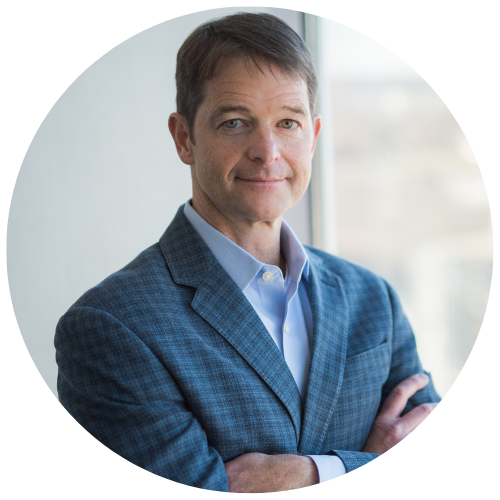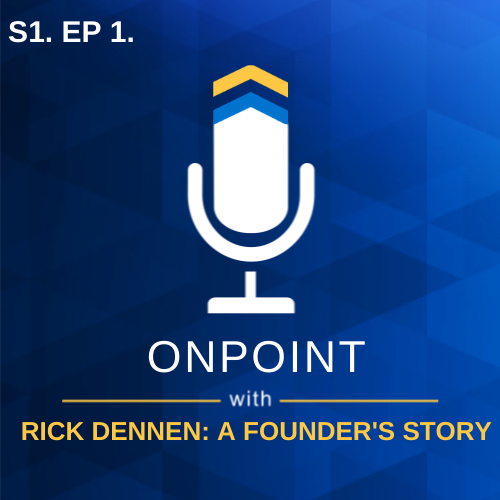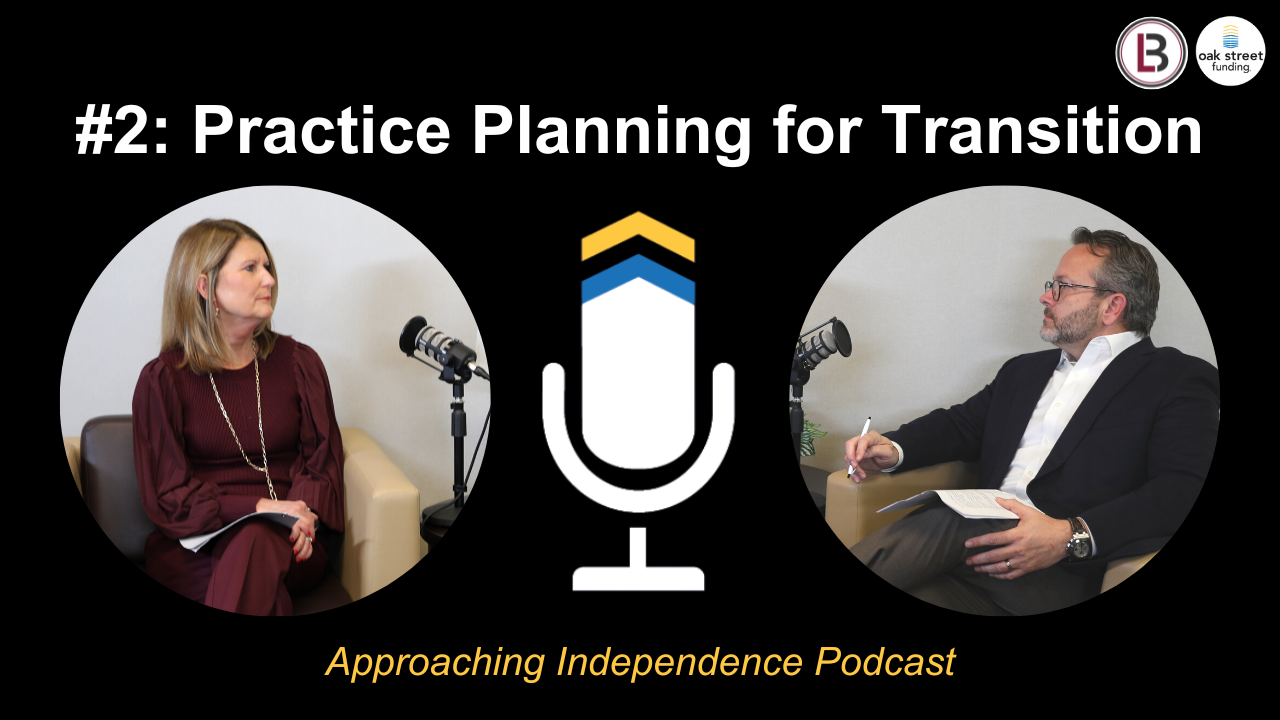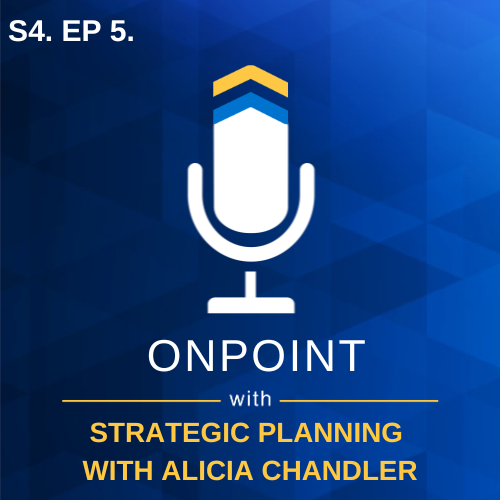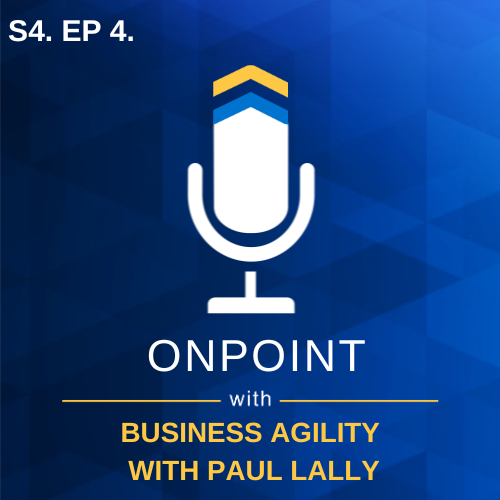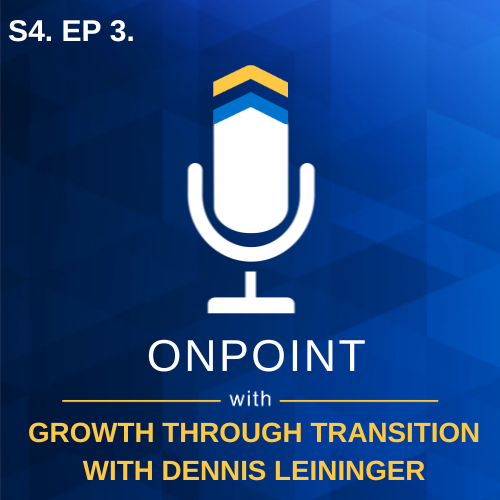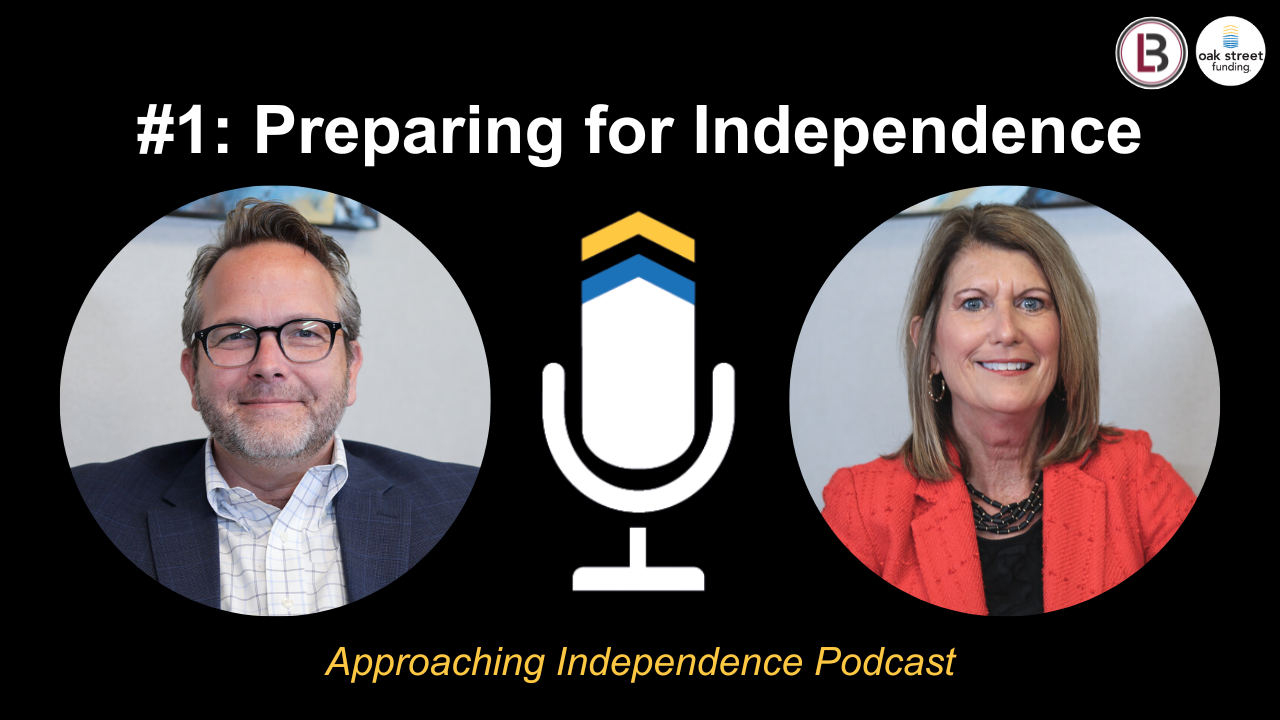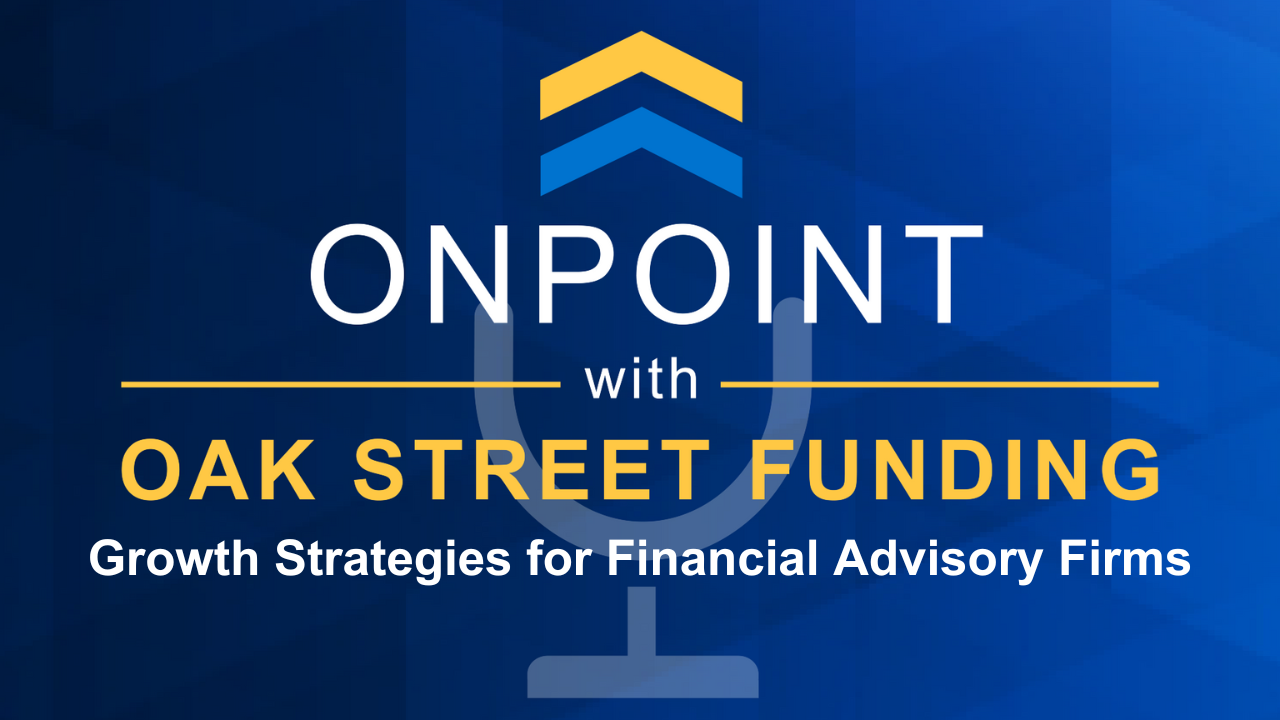S1. Ep. 1 - A Founder's Story - Rick Dennen of Oak Street Funding
- 0.5
- 1
- 1.25
- 1.5
- 1.75
- 2
Bridget Haight: Hello, and welcome to OnPoint, a podcast by Oak Street Funding, where we bring research and data backed insights to dig into the minds of industry leaders, to learn how to stand out, navigate and break through this ever- changing industry. I am your host Bridget Haight, and you can support this podcast by following us on Spotify, Apple podcasts, or our website, or really wherever you get your podcasts. We will be there hanging out, talking to industry leaders and ready to empower you to grow your business. Now let's get on point. Today. I am lucky enough to have Rick Dennen founder and CEO of Oak Street Funding. Rick started Oak street funding in 2003 and sold it to First Financial Bank in 2015. And now is not only CEO of Oak Street Funding, but is chief corporate banking officer at First Financial, where he oversees $12 billion in assets and nearly 400 employees. Rick, thank you for joining us today.
Rick Dennen: Thank you.
Bridget Haight: That's an incredible story from 2003 to now. So can you take us back to 2002 and tell me where your mind was at that time and how Oak Street Funding got started?
Rick Dennen: Sure. I was actually working in a venture capital firm after spending about 10 years in public accounting. And there, I spent a lot of time working with manufacturing companies, working with financial services companies. And while in the VC industry, identified a need that there was a huge void in lending to, and it was businesses that didn't have the tangible assets, cars, manufacturing equipment, things like that. It was all just cash flow based and banks loved to be able to have that stuff so they can touch it, feel it, but these businesses had an incredible asset. A hidden asset was what we used to call it, just a very consistent cashflow stream with future insurance commissions. So we went out and developed along with Milliman, we're some of the top actuaries in the world. We developed actuarial models for every product carrier combination that existed. And what that allowed us to do was to really dissect an agent's book of business and project out truly what the cash flow is. And statistically, those numbers as they've played out with over hundred million data points at this point in time, they've proved that to be very, very accurate. We've been able to take that philosophy and evolve that into other businesses and things like that with some of the other areas that we've endeavored into.
Bridget Haight: Very cool. So you saw a need and you wrote a business plan to start your company. How did you decide on the name Oak Street Funding?
Rick Dennen: That's a pretty easy one to be real honest with you. When you're starting a company, one of the most important things you have is capital, obviously to start the business. And I was working for a company called Oak Street Mortgage, who decided to pony up and give me two and a half million dollars to start this business. So really just a wonderful group of individuals, great management team that was heavy into mortgage. And that was back in 2003, as you mentioned and had the insight at that point in time to say, you know what, we don't really like what we see in the mortgage industry. And we want to diversify away from mortgage so that we have a long term sustainable business and they gave me two and a half million dollars.
Bridget Haight: Then Oak street Funding?
Rick Dennen: Pretty quickly you use Oak Street Funding and that's sure, whatever you want works.
Bridget Haight: Nice. So how did you go about finding your first client to lend to?
Rick Dennen: He was a dear friend and he was in the insurance space in Louisville, Kentucky. And I had known him from the VC world and doing some different things and just the kind of guy that you trust. And I called him up one day and he said," You know what?" I was asking him questions and trying to gain some industry knowledge. He said," Just use me, give me a$ 50,000 loan and I'll be your guinea pig and let's go through the process". And so, I underwrote the loan, looked at the legal docs, negotiated with him, charged them 18% interest rate. I mean, that's what you do for a favor, right?
Bridget Haight: Yeah.
Rick Dennen: But that's kind of what our model was at the time. So I was trying to prove out and see if the model made sense. We don't lend at 18% anymore. But I'll never forget that. And he's an individual that has just been tremendously successful in a number of different industries. And his latest endeavor is in the spirits industry with the Bourbon company.
Bridget Haight: Oh, okay. Do you still lend him?
Rick Dennen: You know what's interesting, we probably had four or five loans to him as he was growing and doing acquisitions. And I think because the spirits industry is so hot, he decided to exit the insurance space and I'm going to venture a guess to say he enjoys selling bourbon more than he does long term care insurance policies.
Bridget Haight: Sounds like fun.
Rick Dennen: Great individual.
Bridget Haight: Wow. I mean, that must have felt amazing landing your first loan. So how have things changed since that first loan? How did that affect your future loans? What changed?
Rick Dennen: You know a lot of things, to be honest with you, obviously it's been almost 20 years now. What I would say is that we really had some defining moments for us in the history that, not much different than what people have in life. We went through the mortgage company, obviously when the mortgage crisis hit in 2000 and five, six and seven. So the capital that was coming from the mortgage industry ceased. You got to figure it out. Then you've got the recession that hit, we sold in 2007. We sold again in 2010. And during each one of those times, you really just have to take a step back and reassess your business model and where it's going. And I really subscribe to what doesn't kill you makes you stronger. And the fact that we had to survive a number of different things that there's no doubt, it made us better. It made us understand technology better, make sure that our models, you pause in the business, make sure your models are accurate, your financials, your control. So we really had different times that we were almost required to pause and rethink the business model, so you're constantly revising it.
Bridget Haight: It sounds like you really made the most of the growing pain of the-
Rick Dennen: Yeah.
Bridget Haight: -business. That's great.
Rick Dennen: Yeah. Yeah.
Bridget Haight: How did you get other people to invest in your idea?
Rick Dennen: You know we were fortunate after the first investors from Oak Street Mortgage with validating in what I would consider, de- risking the business. You might identify five or six different macro things that you look at in the business, you say, is the addressable market big enough? Can you sell it? Sell the products, does the technology work? All these types of things got to play out. So after that first one, we were forced to go out and raise some capital. And it turned out one of our customers who was borrowing money from us, had a PhD from Stanford and he was an actuary himself. And he said," You know what? I'm in."
Bridget Haight: Nice.
Rick Dennen: And that was the second round. And then during oh seven, when we sold, we had nine offers for the business. And then we sold pretty quickly to this group out of Chicago, that six months into that deal, their funds dried up, which you pick up from reading the paper versus getting a call saying," Hey, this is going on." And you got to adjust again. And 2010 when Angela Gordon bought us, which is a 25 billion PE fund out of New York city, it was really the first time we had consistent capital for the business. They were wonderful investors, provided a lot of insight and leadership for us, but they were very supportive of the management team. And that was the first time. So from 2010 to 2015, just knowing that you had the capital there, that you weren't stressed about that, because when you're a finance company capital is everything. You borrow and you re- lend. So if you don't have that capital, you're out of inventory, so you really don't have a business anymore, but very supportive. And the business did very well. I think we grew the portfolio from, I don't know, I'm going to guess 30 or 40 million to almost 400 million.
Bridget Haight: Wow.
Rick Dennen: And so it was a classic PE play. And at the end of five years, we put the company up for sale and had 21 offers and landed with First Financial Bank.
Bridget Haight: Great. So you started out with one employee and now you're-
Rick Dennen: Me.
Bridget Haight: Yes. And now you're at almost 400?
Rick Dennen: Yeah.
Bridget Haight: So can you tell us about how you hire folks? What is your hiring process? How do you build a team? What kind of advice would you have for that?
Rick Dennen: Yeah, so Oak Street was one employee type situation, today we're about 85 or 90. And then with the roles and responsibilities of the bank, it's me to 300 plus 400, whatever. Being in public accounting taught me a couple of things about employees and leadership. And it's really that, to me, human capital is the most important asset you have. And we saw where our business in public accounting went from, the worst ranked office in the country and the profitability was low to, we became their best ranked office in the country and one of the most profitable. And that's not a correlation that's any different than the people that were driving the business. So when you start something, you're pretty particular about, when it's one person and then you're adding a second, well, that's 50% of the workforce, that's going to have a huge influence. Yeah. So you're very particular about who you're adding and there's different ways to, I think start businesses. For example, Oak Street Mortgage started with their C level of people first and hired down, whereas Oak Street started with me at the bottom and we work our way up to the management team that we have now and the 85, 90 people. And I think both can be successful, but understanding and placing the importance on human capital, I think is the key thing for setting culture. And even when we had 10 or 12 people, we had leadership consultants in here to help our people grow, show them that we care. We wanted their growth because if we're getting them to grow, then the business is going to grow and it really played out well.
Bridget Haight: Well, that actually leads me into my next question, because, I mean, you've had some of these employees since the very beginning. You said, "11 or 12, the first 11 or 12".
Rick Dennen: Yeah.
Bridget Haight: And so many small businesses right now are dealing with employee retention. So what kind of advice would you have for small business owners that are struggling to retain their employees?
Rick Dennen: I would say today is certainly uncharted, so to speak. And they're certainly a lot that has to be learned. So what maybe was applied back in 2003, really isn't applicable to today. But I still think it goes back to finding the right people, investing in them, having relationships with them that you understand. And it almost becomes a family type culture that people become ingrained and more passionate about the business and what they're doing on a day to day basis. Those things are going to be important, I think whether there's the work from home or not. So we just announced this past week as we've been tracking and following the pandemic and different types of environments just changed to a work situation where there's three days in the office and two days where they work at home. And I think it's so important to people, younger and old that they can be together and collaborate. If you think about the best way to learn, it's ironic sometimes when I hear that parents are pushing, pushing, pushing for their children to be back in school so that they can learn, be with other kids and socialize and they get the best learning, but yet they want to work at home and you kind of go well, that doesn't make a whole lot of sense. I think there's a lot that applies to that. So we found this, what we think is a great combination, a great hybrid where we can still be collaborative and work together and make sure we're focusing on the customer, educating each other, getting better, improving our process, but it also gives people an opportunity to work at home. And get that work life balance, which is another thing that we talk about here. I mean, that your family life is more important than work. And we say that all the time here. I mean, there's not a person here whose family isn't more important than this job.
Bridget Haight: There's not a lot of company owners that would say that. That's great. That's wonderful. I imagine your employees really appreciate that. So moving on, in 2003 to 2005, these were really formative years for you and Oak Street Funding. But then of course, we were just talking about the great recession happening when Oak Street Funding was still quite young. So how did you handle the disruption?
Rick Dennen: I will tell you that was probably the most stressful time in the organization. And like I said, we're borrowing, so we're a lender now, right? And we've always been a lender, but we were also a borrower and we had a$ 250 million line of credit with a bank out New York that was a co- op of German community banks. And they saw it was going on the mortgage business and they said," We're shutting down". So we had this five- year agreement, thank heavens that it was a five- year agreement, but I received a letter that said," Hey, we're shutting down. We're out of business".
Bridget Haight: That's scary.
Rick Dennen: And about three weeks later, we got a letter that said," Well, we're kind of rethinking that". And I think they started applying some legal issues that they were going to have. But we knew that if we defaulted in any way, shape or form on that credit agreement in the money that we had borrowed, they were going to cut us off. So every Friday, our head of customer service, Cathy Erie and Dave Chrisman, who's our CIO, both still with us today. We would meet every Friday afternoon and go through the entire portfolio and say, are we in compliance? What things do we need to be moving around? And we had about two or$ 300,000 of excess capital. So if one customer that had borrowed$ 500, 000 from us filed a bankruptcy that we were getting every week, we would've been completely out of business. So it was," What have you heard about these customers? And who's doing well, and who's not." And legally doing everything the right way. But we were also trying to make sure that we weren't going to be in default of this agreement because if we were, we were done and nobody was going to lend anybody money to those levels. So again, Bridget, you know what doesn't kill you makes you stronger and you learn from it and you move on.
Bridget Haight: Yeah.
Rick Dennen: But I think that's why this organization is so resilient to change and was so successful during the recessions and certainly during the pandemic.
Bridget Haight: And during the recession, that's about the time that you were really looking to expand too.
Rick Dennen: Yeah.
Bridget Haight: So what steps did you have to take to get to that next level?
Rick Dennen: Again, it goes back to the capital making sure... So what do you do? You go out and you diversify and we found another national bank that gave us$ 125 million. We got a wonderful bunch of local banks here. I'll call them regional banks. And we put together facilities there so that we had these different buckets to be able to place assets in so that if one went bad, we were able to survive.
Bridget Haight: Right.
Rick Dennen: So that's an example of you learn from it. A bank will come to you and say," Hey, there's too much concentration there". And for us, we are with one bank and it was like," All right, there's too much concentration with you. We got to split this up". And that's what we did.
Bridget Haight: Okay. And when did you begin lending to financial advisors and CPAs?
Rick Dennen: 2010 to 2015 while we were under the Angelo Gordon ownership. And as a sponsor to us, we had identified a couple of different areas for growth. And we done our research. We developed the actuarial models and Angelo Gordon was like," We were having such growth in the insurance space that Angelo Gordon was like," Stay focused. It might dilute the story. It might take you, take away some profitability, so let's stay focused on the insurance space". But sure enough, when we put together and went through the sale process in 2015, the next buyer either a PE sponsor or a strategic like a bank wants to understand those upsides. And so we had laid out in the book," Hey, this is our insurance business and here's our growth trajectory, but here's some other industries that we can do the exact same thing in". So First Financial Bank led by Claude Davis at the time when we sold clearly understood it. And so pretty much as soon as the bank sold or the bank bought us, it was the green lights on, let's execute, build that business the same way we build Oak Street. And since then we've added subprime auto finance, CPA firms, energy lending, we're constantly looking to add one a year or something like that in new industries. Not typical commodity type, CNI type lending, but more specialty asset classes and things like that.
Bridget Haight: Before we go, I had two more questions. Who was your mentor and what was a key piece of advice that you keep with you from your mentor?
Rick Dennen: I'm hundred percent honest. I am very fortunate to have a number of mentors. I mean, I can think to my college swim coach, Doc Counsilman at IU to CFOs and CEOs that I'd met while being in public accounting. But my mentor is my father, to be honest with you.
Bridget Haight: The ultimate mentor.
Rick Dennen: Yeah, somebody who put himself through college, had an unbelievable work ethic. And some I didn't really realize when I was growing up, but he was an entrepreneur as well and being an accountant, it's like, well, he's an accountant and I ended up being an accounting major. But when I went back and I got out of college and I understood his career. He started a CPA firm and sold it. Went to a manufacturing firm and sold it, started another firm and sold it. And I didn't really put that to together even when I was starting the business.
Bridget Haight: Well, I have one last question. What advice would you give to your younger self? What would you tell young Rick Dennen?
Rick Dennen: That's interesting. But I would say probably most is, make sure you understand your strengths and weaknesses.
Bridget Haight: Mm- hmm( affirmative).
Rick Dennen: And don't think that you need to be the best at everything you do.
Bridget Haight: Good advice.
Rick Dennen: And you can hire those skill sets that you're not so good at and let people give them the confidence and give them the autonomy to go and run it, grow. And I think it creates a little more passion and a little more care for an engagement, really with what people are trying to do.
Bridget Haight: Yeah. Good advice.
Rick Dennen: Thanks.
Bridget Haight: Thank you, Rick. Thanks for being here. Thank you-
Rick Dennen: Thank you, Bridget.
Bridget Haight: -fortaking your time. Thank you all for listening to OnPoint a podcast by Oak Street Funding, where we bring research and data backed insights to dig into the minds of industry leaders, to learn how to stand out, to navigate and break through this ever- changing industry. I'm Bridget Haight and tune in next time, wherever you listen to podcasts to hear Jane Saxon with Somerset CPA and Advisors. She will discuss setting up a tax efficient business structure. And we'll see you then as we get on point. Don't forget to subscribe and leave us a review.
DESCRIPTION
Rick Dennen, CEO and Founder of Oak Street Funding, joined the OnPoint podcast to tell his story of starting Oak Street Funding in 2003. He discusses operating during disruption, retaining employees, focusing on people, and tips for business growth. Want to learn more?
Call 844-353-8022 to speak to an Oak Street Funding team member today.
Today's Host
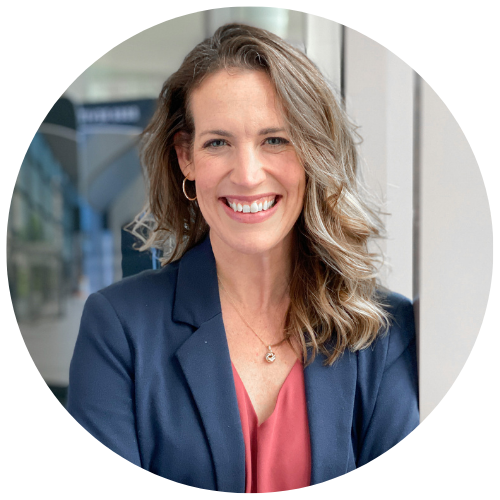
Bridget Haight
Today's Guests
